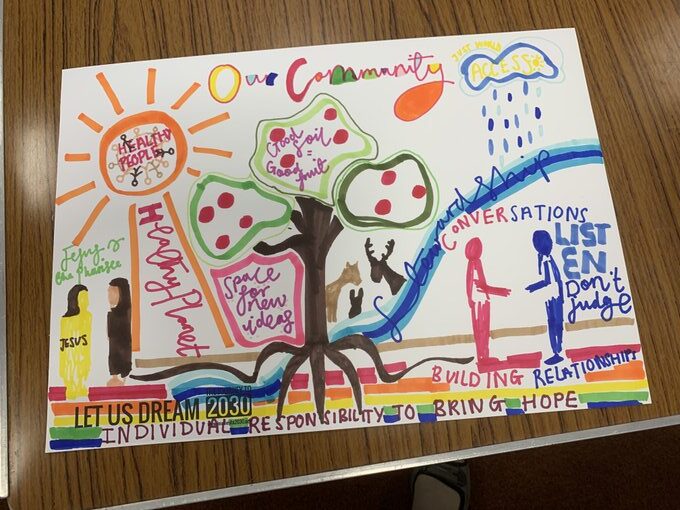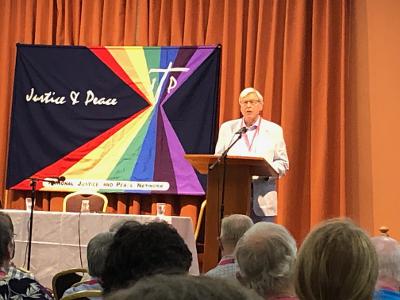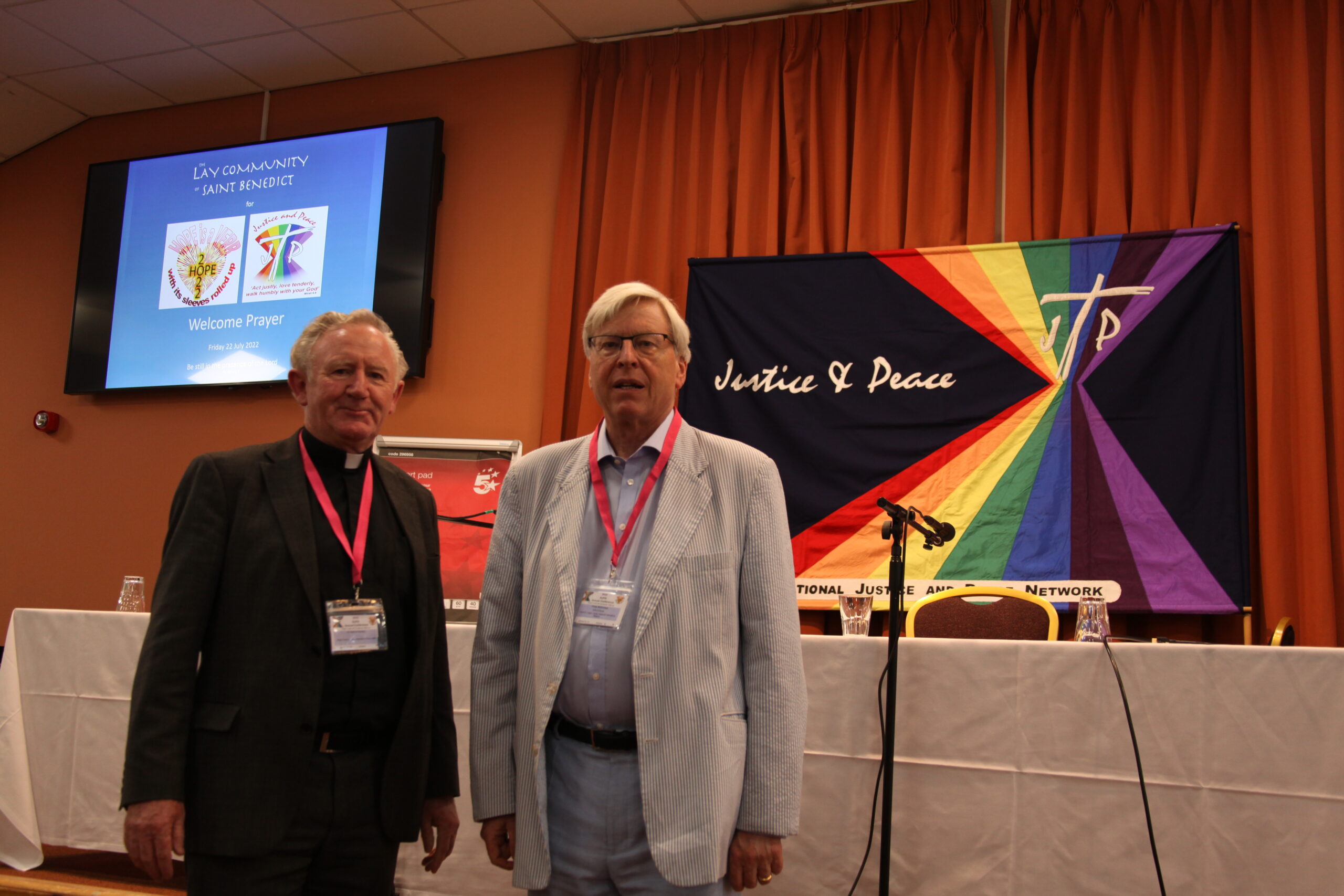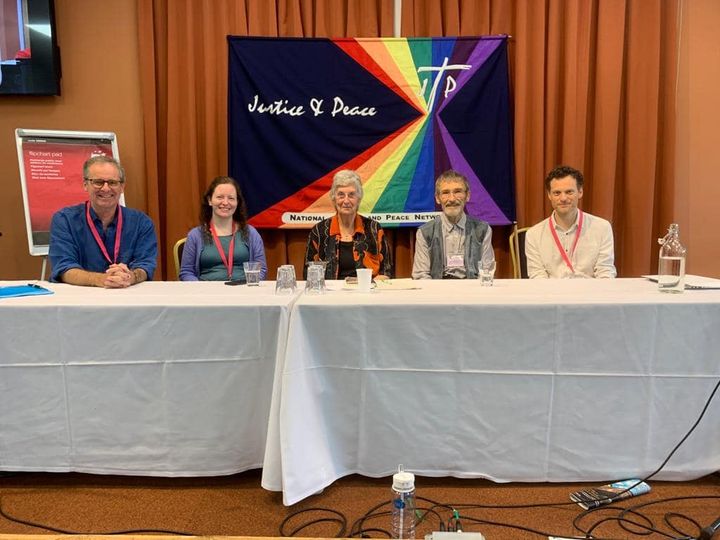
NJPN Conference 2022: ‘Let us build the City of God’
NJPN Conference 2022: ‘Let us build the City of God’ 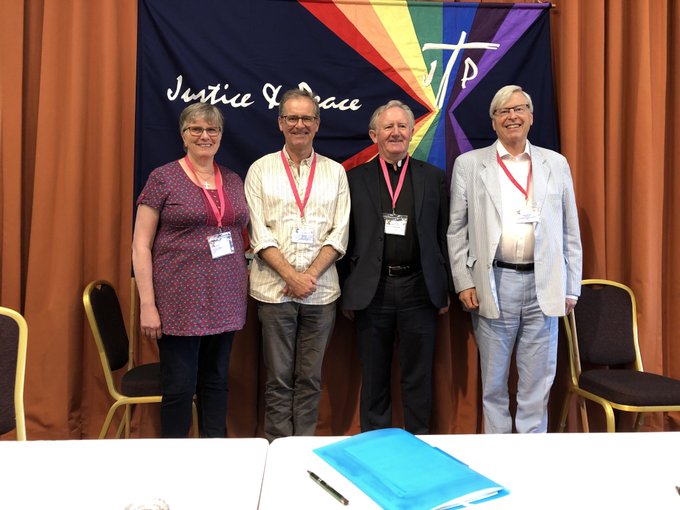
Media Release
24 July 2022
‘Let us build the city of God’ by Dan Shutte was the final hymn of the 2022 annual weekend conference of the National Justice and Peace Network (NJPN) on Sunday. It summed up a morning highlighting the work of NJPN members to build a more just, peaceful and sustainable world. And some of the 160 participants at NJPN’s 44th conference 22-24 July in Derbyshire were dancing to the hymn at a gathering which took the theme, ‘Hope is a verb with its sleeves rolled up.”
Sunday morning was the final session chaired by Tim Livesey, CEO of Embrace the Middle East, which works with marginalised and excluded communities. It was uplifting, focusing on ‘Signs of Hope’ and introduced with, “four members will inform us what it means for hope to be a verb.”
Aisling Griffin, Schools and Youth Worker Pax Christi, reported that, “injustice, peace, fairness and climate change are among the issues important for young people” and “teachers find young people more interested in social justice than ever before.” She said young people want practical ideas and she was “fortunate” to work on peace education with networks such as the Columban Education programme, CAFOD, Christian Student Movement, Young Christian Climate Network, Interfaith Youth Network and Teach for the Future. The Million Minutes Awards recognise young people putting Catholic Social Teaching into action, and she applauded the young people who received awards at the Westminster parliament three weeks ago. “Young people want to put their faith into action; they are involved in and leading social action; they are the hope for the present as well as the future of the Church.”
Ann Farr, Pax Christi’s Chair, reported on solidarity work in the Middle East. She has worked with Palestinians and Israelis as an ecumenical accompanier. Ann reported that Palestinians see hope in the replanting of olive trees destroyed by settlers seeking to claim Palestinian land. They plant new trees and are supported by the international community donating trees. Ann pointed to the L’arche project in Bethlehem, where disabled people are treated with respect, and the work of Comboni Sisters with the Jahalin Bedouin who have lost their ancestral homes and their traditional way of life but still manage to produce a ‘HOPE’ mural on the wall of a school. Pax Christi partners, the Arab Educational Institute and Wiam, were mentioned, who work everyday with people experiencing violence. “They create spaces of encouragement and it is essential we support activities in the West Bank,” she said. She urged the international community to bring hope by challenging systems in the Middle East which cause injustice. A Pax Christ prayer card was handed out.
Martin Birdseye of Christian CND talked of “many years working to end nuclear weapons,” and lamented that there remain about 13,000 weapons around the world. He talked of work towards the Treaty on the Prohibition of Nuclear Weapons, which 122 nations have signed. “We have an important role – as citizens of one of the nuclear weapons states – to get our government to sign up to the Treaty” he said. He urged participants to get their home areas to produce local resolutions, as Manchester has done. “We need to get on with abolishing nuclear weapons,” he added, “and this will bring an active hope.”
John Paul de Quay of Journey to 2020 and the NJPN Environment Working Group talked of the focus on “ecological conversion” inspired by ‘Laudato Si’ and the call of Pope Francis in ‘Let Us Dream’. He said Journey to 2030, “is about reimagination and we need creative interventions.” The conference was invited to form groups to produce artwork on hopeful pathways for the future and ideas they came up with included gardens, wildflower meadows, education to recognise the interconnectedness of issues, good public transport and green buildings. “Everyone should have the opportunity to share real wealth and to thrive,” said one feedback.
Ashley Ralston of the NJPN Environment Group introduced campaigning recommendations in the lead up to November’s COP27 UN Climate talks in Egypt. The UK will be urged to fulfil pledges made in Glasgow last November on reducing carbon emissions and phase out fossil fuels. Forests, oceans and biodiversity need better protection from pollution and large-scale extractive industries. “It is very important that Churches speak up and hold the UK government to account for delivering and building on COP26 commitments at COP27,” suggested Ashley and “this is a key chance to avoid catastrophic climate change.”
Keynote speakers throughout the weekend explored the conference theme of ‘Hope’. Irish diplomat Philip McDonagh explored the meaning of hope, drawing on Pope Benedict’s encyclical Spe Salvi, especially the statement that “all serious and upright conduct is hope in action.” He felt “we should ‘image’ or visualise peace as the rightful possession of the human community as a whole,” despite current global conflicts. He felt that, “through developing a culture of dialogue or encounter in national, regional, and global politics we can transform our understanding of effective action and create the conditions for a different kind of civilisation.” He felt, “the National Peace and Justice Network is living proof that individual interventions in the name of justice and mercy reinforce one another and can support wider social objectives as well.” He pointed to the United Nations Sustainable Development Goals (SDGs) as already providing a common plan for humanity and called for consultative processes to include representatives of religion to underpin their implementation. “In this moment of fractured politics and dissolving ethics, renewed attention to religion as a source of unity is a bold and much-needed initiative,” he suggested.
Rev Dr Patrick Devine SMA spoke of his peacebuilding work in East Africa as
chairman of the Shalom Center for Conflict Resolution and Reconciliation. Shalom seeks to identify, understand and address the underlying causes of conflict rather than just address the symptoms. Fr Devine spoke of dramatic, life-changing results in the areas of conflict transformation, peace education and poverty alleviation. Shalom researches root causes of inter-ethnic conflicts, trains local peace-builders, organises workshops to facilitate resolution and reconciliation processes between factions, and develops inter-ethnic and inter-religious schools. “Theory without practice is empty and practice without theory is blind,” he said.
‘Getting beyond Optimism to Hope: demonstrating or building the Kingdom in the world of politics,’ was the title of a presentation by Andy Flanagan of Christians in Politics and a singer-songwriter. He spoke of leading parliamentarians in singing about integrity, truth and justice at a parliamentary prayer breakfast in early July and a spate of government ministerial resignations which took place hours later! Christians believe that, “integrity in leadership is really important.” A firm believer in tackling the causes of injustice, he praised NJPN for its campaigning work over the years to promote justice and compassion. His music provided the Saturday evening entertainment.
Liturgies were organised by the Lay Community of St Benedict and both Catholic and ecumenical worship was offered. Conference planning partners included ACTA, Christians Aware, Joint Public Issues Team, and Stella Maris. Rev Ruth Gee, a Methodist pastor and patron of NJPN who led a service on Saturday afternoon, spoke of, “being united by concern and passion for justice and peace and by a shared faith.”
Workshops included issues of domestic poverty and universal credit, Salford’s ‘Guardians of Creation’ project, restoring dignity to prisoners and their families, Church Action for Tax Justice and Interfaith work on Justice and Peace. A preview of the film, ‘Finite: The Science of Climate Change’, which looks at non-violent direct action in Germany and UK to protect ancient forests from coal mines, attracted an audience of 60.
A Just Fair hosted 25 stalls, including Together for the Common Good, Green Christian, Christian Climate Action, Columbans, Missio, World Community for Christian Meditation, Fairtrade, Palestinian Goods and Global Justice Now. Food at the conference was guided by LOAF principles (Local, Organic, Animal Friendly, Fairly Traded). Participants left with plenty of ideas and inspiration.
All talks from NJPN Conference 2022, ‘Hope is a verb with its sleeves rolled up’
at:
https://www.youtube.com/playlist?list=PL4HAuivOZMEVt5GE-gSBfoVQbZ4PtE_av





